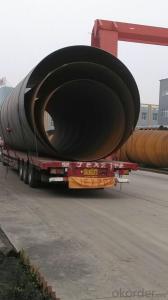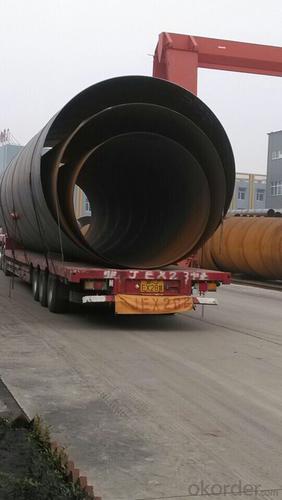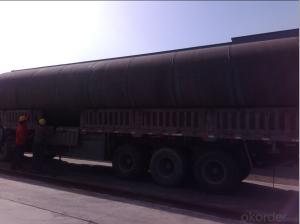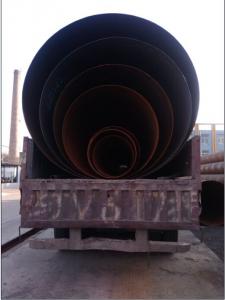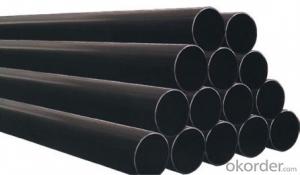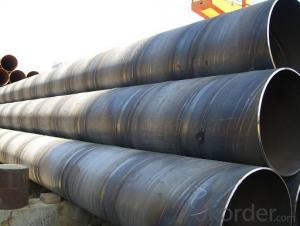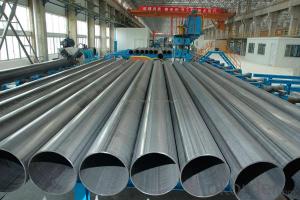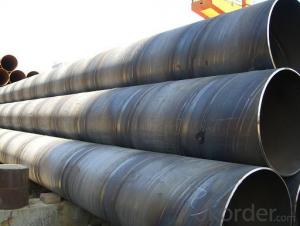38'' CARBON STEEL SSAW WELDED PIPE API/ASTM/JIS/DIN
- Loading Port:
- Tianjin
- Payment Terms:
- TT OR LC
- Min Order Qty:
- 5 m.t
- Supply Capability:
- 300 m.t/month
OKorder Service Pledge
OKorder Financial Service
You Might Also Like
Packaging & Delivery
Packaging Detail: | standard export packing or as customer's requirement |
Delivery Detail: | within 10 - 30 days |
Specifications
Spiral Welded Steel Pipes and Tubes
1.Material:Q195-Q235
2.Length:1-12m
3.WT:1.0-14mm
4.O.D.:20-273mm
Product Description:
1.Material : Q235,Q345,L245,L290,L360,L415,L450,L485,GrB,X42,46,X52,X56,X60,X65,X70,X80,X100
2,Standard: SY/T5037-2000,GB/T9711-2011,API Spec 5L PSL1/PSL2,ASTM A252\A53,ISO3183,DIN17172,EN10217,JIS G3457,AWWA C200,ASTM A139,ASTM A671,ASTM A672
3.Wall thickness: 3.0mm-30mm
4.Outer diameter: φ168mm-3020mm
5,Length: 5m-12m or as your requirement
6,Corrosion protection standard: DIN30670,DIN30671, AWWAC210, AWWA C203, SY/T0413-2002,SY/T0414-2002
7,Application: Oil, gas, natural gas, water pipe, thermal electricity pipe, steel structure engineering, etc
Q195-q345 Material Steel Pipe's Materials
Elements | Chemical Compsition% | Mechanical Property | ||||||
C% | Mn% | S% | P% | Si% | Yield Point (Mpa) | Tensile Strength(Mpa) | Elongation | |
Q195 | 0.06-0.12 | 0.25-0.50 | <0.050< span=""> | <0.045< span=""> | <0.030< span=""> | >195 | 315-430 | 32-33 |
Q215 | 0.09-0.15 | 0.25-0.55 | <0.05< span=""> | <0.045< span=""> | <0.030< span=""> | >215 | 335-450 | 26-31 |
Q235 | 0.12-0.20 | 0.30-0.70 | <0.045< span=""> | <0.045< span=""> | <0.030< span=""> | >235 | 375-500 | 24-26 |
Q345 | <0.20< span=""> | 1.0-1.6 | <0.040< span=""> | <0.040< span=""> | <0.55< span=""> | >345 | 470-630 | 21-22 |
Packaging & Delivery
Packaging Detail: | Normal exporting packing,in container or bulk vessel or as per clients' request |
Delivery Detail: | 2 months after confimed contract |
Specifications
Large Diameter API 5L X70 PSL2 LSAW Steel Pipe
Grade: X42, X46, X50, X52, X60, B, C
OD: 1.5"-28"
WT: SCH10-SCH160
Brand:TPCO
Large Diameter API 5L X70 PSL2 LSAW Steel Pipe
Specifications:
u Standard: API 5L
u Grade: B, C, X42, X46, X50, X52, X56, X60, X65, X70, X80
u OD: 1.5"-28"
u WT: SCH10-SCH160
u Length: 5-12m
u Ends Finish: plain end, bevel end, grooved end
u Surface Treatment: bare, black varnished, oiled finish, red color, anti-corrosion, 3PE, FBE or epoxy coating
u Technique: hot rolled or cold drawn
u Application: api 5l steel pipe for conveying oil, water, gas
u Invoicing: based on theoretical weight or actual weight
u Payment Terms: L/C at sight, T/T or Western Union
u Trade Terms: FOB, CFR, CIF
u Certification: ABS manufacturing assessment, ABS design assessment, API 5CT, API 5L, DNV manufacturer certificate, ISO9001 quality management system certificate, ISO14001 environment management system certificate, GB/T28001 occupational health and safety management system certificate, A1 class manufacturing license of special equipment certificate, CCS, GL, LR, SGS, TüV, PDE
- Q: Are steel pipes suitable for use in coastal areas?
- Yes, steel pipes are suitable for use in coastal areas. Steel is highly durable and resistant to corrosion, making it an ideal choice for withstanding the harsh conditions typically found in coastal environments, such as saltwater, high humidity, and strong winds. Additionally, steel pipes offer excellent strength and stability, ensuring their longevity and reliability in coastal applications.
- Q: Can steel pipes be used for underground fuel pipelines?
- Yes, steel pipes can be used for underground fuel pipelines. Steel pipes are commonly used for underground fuel pipelines due to their strength, durability, and resistance to corrosion, making them suitable for transporting fuel safely and efficiently.
- Q: What is the difference between steel pipes and FRP pipes?
- Steel pipes and FRP pipes are commonly used in various industries and applications, but they differ in several ways: 1. Material Composition: Steel pipes are constructed from iron and carbon alloys, along with elements like manganese, silicon, and small amounts of other metals. Conversely, FRP pipes consist of a polymer matrix reinforced with fibers such as glass or carbon. 2. Strength and Durability: Steel pipes are renowned for their exceptional strength and durability, enabling them to endure high pressures, heavy loads, and extreme temperatures. Although FRP pipes are also strong and durable, they are comparatively lighter in weight and may not possess the same level of strength as steel pipes. Nonetheless, they excel in corrosion resistance and have a longer lifespan in corrosive environments. 3. Corrosion Resistance: Steel pipes are susceptible to corrosion and thus require protective coatings or linings to prevent rust and deterioration. In contrast, FRP pipes possess inherent corrosion resistance and do not necessitate additional coatings. Consequently, they are well-suited for transporting corrosive fluids or functioning in corrosive environments. 4. Installation and Maintenance: Installing steel pipes necessitates specialized welding or threading techniques. Consequently, installation can be more labor-intensive and time-consuming, particularly for complex or large-scale projects. Conversely, FRP pipes are lightweight and easily transportable and installed. Often arriving in pre-fabricated sections, they expedite installation, reduce labor requirements, and demand minimal maintenance in comparison to steel pipes. 5. Cost: Generally, steel pipes are more expensive than FRP pipes due to the higher cost of raw materials and the need for additional corrosion protection measures. FRP pipes offer a cost-effective alternative, particularly in applications where corrosion resistance is paramount, as they eliminate the necessity for expensive coatings or linings. Ultimately, the selection between steel pipes and FRP pipes depends on the specific requirements of the application. Steel pipes are favored for their high strength, whereas FRP pipes offer advantages such as corrosion resistance, lightweight construction, and cost-effectiveness.
- Q: How are steel pipes insulated for thermal efficiency?
- Steel pipes are insulated for thermal efficiency by adding a layer of insulation material around them. This insulation helps to reduce heat transfer through the pipes, preventing energy loss and maintaining the desired temperature.
- Q: What is the weight of hot galvanized steel tubes? DN150 4mm wall thickness
- GB/T3091-2008: DN150 welded steel pipe, wall thickness of 6mm, the theory of the weight of welded steel pipe 24.02kg/m, galvanized steel pipe should be multiplied by the weight coefficient after galvanizing, C, DN150, wall thickness of 6mm, C=1.02, DN150, theoretical weight and wall thickness of 6mm galvanized steel 1.02*24.02= 24.5kg/m.
- Q: How do you join steel pipes together?
- Steel pipes can be joined together using various methods, including welding, threaded connections, flanges, and mechanical couplings. The most common method is welding, where the ends of the pipes are heated and fused together using a welding electrode. Threaded connections involve screwing the pipes together using male and female threads. Flanges are used for larger pipes and involve bolting two flanges together with a gasket in between. Mechanical couplings use compression or clamping mechanisms to connect pipes without the need for welding or threading.
- Q: What are the different types of steel pipe supports?
- Some different types of steel pipe supports include pipe hangers, pipe clamps, pipe straps, and pipe saddles. These supports are used to secure and stabilize pipes in various applications, ensuring their proper alignment and preventing sagging or movement.
- Q: Which is cheaper, angle iron or steel pipe?
- Angle called angle, the steel strip is perpendicular to each other on both sides into the corner. There are equal angles and unequal angles. The two sides of an equal angle steel are equal in width. The specifications are expressed in millimeters of edge width * edge width * edge thickness. Such as "/ 30 x 30 x 3", that is 30 mm width equal angle, edge thickness of 3 mm. Also available models that model is the number of centimeters wide, such as angle 3#.
- Q: What are the different types of coatings used on steel pipes?
- There are several different types of coatings used on steel pipes, including polyethylene, fusion bonded epoxy, coal tar enamel, and asphalt enamel. These coatings provide protection against corrosion, abrasion, and other forms of damage, ensuring the longevity and durability of the steel pipes.
- Q: How are steel pipes coated for underground applications?
- Steel pipes are typically coated for underground applications using a variety of methods, including but not limited to hot-dip galvanizing, epoxy coating, and polyethylene wrapping. These protective coatings help prevent corrosion, increase the lifespan of the pipes, and ensure their reliability in underground environments.
Send your message to us
38'' CARBON STEEL SSAW WELDED PIPE API/ASTM/JIS/DIN
- Loading Port:
- Tianjin
- Payment Terms:
- TT OR LC
- Min Order Qty:
- 5 m.t
- Supply Capability:
- 300 m.t/month
OKorder Service Pledge
OKorder Financial Service
Similar products
Hot products
Hot Searches
Related keywords
